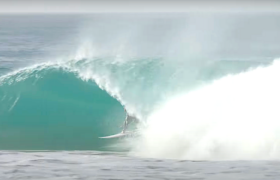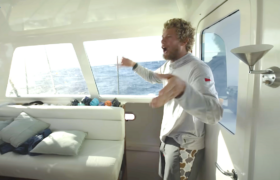"Having my jaw decompressing plate also highlighted that I now didn’t have the strength in my neck to protect me from whiplash."
The two-time professional surfing champion Tyler Wright is nothing if not extremely and wholly inspiring. After winning back-to-back titles in the mid-2010s, the Culburra Beach born regular foot contracted the African Flu which lead to a long and brutal battle with post-viral syndrome which left her unable to get up in the morning. After fighting her way back to health, Wright opened up about the other obstacles overcome along the way. Her father, for example, made her drop out of school to surf all day. In a wide-ranging interview with ESPN she shared, “Everyone was like, ‘You’re living the dream at 16.’ I was like, ‘Whose dream? I don’t f—ing dream of this s—. I want to read books. I want to go to school.'”
There was much more, too many obstacles to properly recount, but fast-forwarding to this year, Wright admitted that she has been perpetually choking this whole time.
“I’ve had a fair few doctors and specialists tell me they don’t know how I do what I do. I found out that most of the time I’m under-oxygenated and semi-suffocating,” she shared sixth months ago, “My airways are too small basically, and over the off-season I had it expanded. Honestly it’s been life-changing, it’s the sanest I’ve ever felt. It’s really successful, it’s changing my life, but it’s also a process and that’s only step one and a half of a multi-step process.”
The expander allowed for flow of much needed air into lungs and the new season was filled with hope and joy. Well, it turns a new and unexpected medical horror was lurking. Taking to Instagram, Wright shared:

2024 season is a wrap, thank you to my wife and the Ocean. It wasn’t the season I wanted in terms of results and injuries however it put me into positions and situations where I had the opportunity to grow into someone that I am proud of.
Having this be the first season after getting my maxillary expander put in, I was so excited for all the things I could possibly accomplish this year. Even in the few months between getting it put in and competing, I had found it had improved my quality of life in such an enormous way and I couldn’t wait to see the benefits in my CT season. Unfortunately there was one aspect of this maxillary expansion process that proved to be a huge obstacle and was a reoccurring theme through this whole year. Due to the changing of bone structure in my head, leading to extra pressure on the sutures, plus the nature of the sport, I became temporarily a significant amount more susceptible to concussion. Having my jaw decompressing plate also highlighted that I now didn’t have the strength in my neck to protect me from whiplash.
My first surf after getting off the plane in Hawaii for the first event left me with a serious concussion and ended up setting the tone for the rest of the year. Through the season I struggled with multiple smaller hits to the head which previously wouldn’t have been on my radar but were now amplified with the additional pressure in my skull plus one more significant hit in Tahiti. It was devastating going into the season feeling the healthiest and happiest I’ve ever been to having that taken away so quickly and knocked straight back down as soon as I found my feet.
My maxillary expander has improved my life incredibly and I can acknowledge that I was navigating a new physical system with new obstacles this year that definitely took a toll on my competitive results. I learnt a lot this year around my mentality, resilience, values, and what I want. It may not have been the year I wanted but maybe the year I needed.
Argh.
Can’t a girl just catch a break?
Well, here’s to next year, I guess.
More as the story develops.







